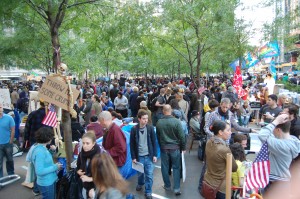Sabbath

I had such a hard time packing for my weekend away — cramming my bag with a stack of contemplative practice books, an anthology of my personal prayer journals, candles, an array of writing of instruments, and an iPod fully loaded with chanting monks and Hillsong worship songs. What does one take to a three-day silent retreat? Apparently a lot of noise.
My husband I were in the throes of church planting in Harlem. Our commitment to reimagining church not as a building, but as an incarnational community living out the Gospel of Jesus Christ had left our calendars fully loaded with “to do” lists for neighborhood barbecues, marches against “stop and frisk” laws, and prayer circles that met in our home.
And I was tired.

From hosting electronic dance revivals and nightly “beer and hymns” to featuring the hijinks of Christian carnies, the Goose sure knows how to let loose. Yet, this holy mischief is often missing in our life and work together. In our resistance to empire and the systems of domination that pervade our life and being, we tend to take ourselves too seriously. For many, Christianity has become staid and void of imagination. But it doesn’t have to be this way. What if we risked it all like holy fools?

As preoccupied as I get with working, I love the deadly sin of sloth.
Rather, I love to think that I’m above it. I value hard work and I work hard. I judge my days by my to-do lists and the number of items crossed off at the end of the day. It doesn’t matter if my lists are for work during the day, relaxing in the evenings, or even my time off.
On Saturdays I have a list of friends I need to email and get-togethers I want to plan for the coming week. Usually reading at least one chapter of a book makes the list. So do the normal chores of tidying my room and doing the week’s laundry. Not to mention the long list of news articles or theological blog posts I have constantly open on my computer for reading at any resting moment.
And that’s what my rest looks like.
Now that I’ve made myself look like an industrious and hardworking person, let me be the first to say these lists don’t get done. Note I didn’t say they sometimes don’t get finished. I never finish them.

Sloth. It’s not just a strange, adorable animal we love to watch in videos. It’s also one of the “Seven Deadly Sins,” and one that I find hanging around in my daily life.
I didn’t think about sloth in particular when I chose my Lenten practices for this year, but it turns out to be the very beast (sorry) I’m trying to walk away from.
To be clear, I’m a pretty active person. I walk to work, run long distance, and I’m also very social. But the fact is, every night I look forward to getting home and enjoying what I tell myself I’ve earned: as much time on the couch watching TV and eating as I want. It’s relaxing, I figure, and takes no mental or physical energy.
This is the proverbial sloth in the room.
Yes, unwinding is good, but here’s the problem: I’m not really getting any rest from this. Sure, I’m lounging, and my brain takes a rest if I’m watching something inane; but as a Christian, rest means something different than it does for other people. Rest means Sabbath. Sabbath is the day of the week that we hold sacred, the day when we rest from our usual work and worries, the day that we give back to God and use to worship God. So ironically, my approach to getting the sloth out of my life is to bring the Sabbath into it, at the end of each day.
THE STILL, ATTENTIVE, affectionate, at times lamenting, always sagacious, well-defined, occasional poems in This Day, Wendell Berry’s most recent collection, are a magnificent gift to American letters.
For nearly 35 years Berry has kept the Sabbath holy. His practice is either unorthodox or so deeply orthodox that professional religionists may not recognize it. On Sundays Berry walks his Kentucky “home place,” the roughly 125 acres of bottom land in the region his family has farmed for more than 200 years. From the seventh-day silence, solitude, and natural world, Berry has crafted his Sabbath poems.
“Occasional poems” commemorate public events, but here Berry lays quiet markers to remember personal days in the life of one man. He writes in the preface: “though I am happy to think that poetry may be reclaiming its public life, I am equally happy to insist that poetry also has a private life that is more important to it and more necessary to us.”
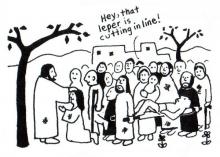
I have to say, one of my very favorite things about Jesus is how he does whatever he wants to and could really give a hell about how other people feel about it. Yeah. I just find that endearing — especially when he irritates the nice religious people. That’s secretly my favorite.
In our Gospel text for today Jesus is teaching in the synagogue on a Sabbath when he sees a woman with a crippled back. He saw her, called her over and said “Woman you are set free from your ailment.” He reached out and touched her and she stood upright for the first time in 18 years and praised God — which seems like a win. Except for that then the leader of the synagogue throws a little tizzy about how that kind of thing should not be happening on the Sabbath. Further proof that super religious people can just be so helpful, can’t they?
Especially when they seem to value parameters over people – which should sound like a familiar story …
Stories of churches denying your call to ministry because you fall outside the parameters of which gender is allowed to be ordained and stories of churches denying you the Eucharist because you fall outside the parameters of what kind of sexual orientation is allowed to receive the means of grace and stories of churches denying you a place in community because you just weren’t sure if you believed in God and that falls outside the parameters of doctrinal purity – well, these kind of stories are sadly bordering on cliché around here. We hear them all the time.

The British government plans to investigate whether other Jews were denied employment benefits after an Orthodox Jew who refused to work on the Sabbath won a landmark appeal.
Jacob Slinger, a 19-year-old who lives in Greater Manchester, won an appeal against the Department of Works and Pensions after he’d been denied a jobseeker’s allowance of 56.80 pounds ($86.67) a week because he refused to work on Saturdays. He told the tribunal he had to rely on the generosity of his grandmother to survive.
After listening to his case, tribunal judge David Hewitt ordered the DWP to pay Slinger 1,500 pounds ($2,288) in benefits and called on other Jewish people who had been denied benefits to come forward.

It's no secret that most of us find ourselves longing for chances to vacate our normal scenery and the bustle of our everyday activities. It is, of course, a luxury and blessing of the modern world — and definitely of our country — that many of us have expendable income and time, but the ability and desire to take a break is something most of us would say that we need on occasion.
I think there is a biblical tie-in here as well. One of the spiritual revelations during my seminary years was one professor's focus on the “eighth day.” You are familiar, I am sure with Genesis' seven-day creation narrative. God created the heavens, the earth, animals, and mankind in six days. Then on the seventh day, God rested. This Divine day of rest then became the basis for God's gift of the Sabbath. It was a law (or was it Gospel?) given to God’s people in the book of Exodus, commanding that they break from work on the seventh day of the week — traditionally Saturday for the Jewish people. This day of rest was given so the people could find peace in not working, but also peace in God's presence. For the Jewish nation just released from slavery in Egypt, this day revealed a stark contrast from their lives as slaves — they now lived their lives as a chosen people of God.
This Sabbath tradition continued through the Old Testament and was even adopted by other cultures. But in spite of this gift, God's people never found true peace. Trouble continued, wars waged, life was still not perfect. Then, in the New Testament something happens. The Gospels each build up to, and point us toward, the cross. We see the seven-day passion narrative unfold beginning with the triumphal entry, climaxing in the cross, and then, following the historic tradition, Saturday becoming a day of rest as Christ is in the tomb.
But something changes.
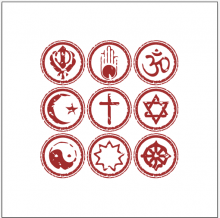
BECAUSE I'M A Jew in Bethlehem, Pa., also known as “Christmas City USA,” I spend December celebrating Jesus’ birth. Representations of other religions are largely absent, but with evergreen trees adorning lampposts, the nativity scene at city hall, and 6-foot-high electric Advent candles, Christmas here is both beautiful and unavoidable.
Given Christianity’s dominance in the United States, similar examples extend into other seasons and across the country. Christian holidays and Sunday receive scheduling deference, Christian worship options are varied and plentiful, and debates over public “religion” focus almost entirely on Christianity. In contrast, Jews use vacation days to observe holidays, Jewish religious communities are far fewer, and there is no movement advocating Jewish prayer in schools.
Even in interreligious settings intended to be neutral, Christianity retains primacy. Exchanges emphasize concepts in Christianity, such as belief and faith, and downplay the Jewish stress on action, behavior, and ritual. When interfaith interactions turn to biblical texts, they rely on Christian hermeneutical approaches such as using English translations without acknowledgment of their underlying Hebrew and eschewing the Jewish practice of viewing the Bible through subsequent commentaries. To me, these verses look discomfortingly naked when not swaddled with sages’ centuries-old wisdom, and Christian translations often conflict with how I understand the original language.
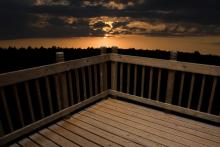
I’ve often heard that Lent is a season of slowing down. Of drawing closer to God, to others, to the wide open world around us. A time for spiritual reflection and inner examination. An opportunity to go a little deeper in trying to figure out Jesus. A time to pause. A time for simplicity.
This Lent, I decided to get back into biking to and from work (in addition to cold showers and placing a penny in the “Suck it Up or Shut Up” jar each time I catch myself complaining).
When I moved across town in June, I said I’d bike once I found a good route, but I weaseled my way out of it for reasons such as having to bike through some sketchy areas by myself, something I was a bit fearful of.
Now a few days into it, I’ve found a route and a rhythm. I got off to a rough start the first day of Lent, biking home drenched by the down-pouring rain. Two cars didn’t see me, causing me slam on the brakes, skidding in the middle of an intersection. Cars passing by splashed water up against me like a small ocean wave. It was cold. It was dark. And I kept making wrong turns, making my time in the rain even longer. I had a “shake your fist at God” moment, muttering things that warranted pennies in the jar, and then managed to put my sopping wet hand back on the handlebar. I thought about the journey that women in Africa make to and from water wells and firewood piles on a daily basis, often risking the possibility of getting raped just to gather these essentials for their families. Surely, I didn’t have it so bad.
And most of us don’t.

"Time is money," wrote Ben Franklin in "Advice to a Young Tradesman, Written by an Old One." The saying that has embodied the Protestant work ethic since 1748 is no less relevant in our 21st-century postmodern culture. Our consumer-based economy thrives on packing as much productivity into our 1,440 minutes per day as possible. And, with the demands of technology, we're too distracted to notice how stressed out we've become.
In my lifetime, I've seen blue laws repealed such that Sunday has become virtually indistinguishable from any other day for many service workers. But in 2012, we hit a new low: for the first time major retailers opened their doors for shopping on Thanksgiving evening. Several employees mounted petition campaigns — one garnered more than 30,000 signatures — pleading for the full day off to be with their families, but to no avail. Official corporate announcements stated, "The super majority of our 1.3 million associates are excited about Black Friday and are ready to serve our customers."
Really, they needn't have bothered. The Internet has already granted consumers the ability to shop constantly. Every time I log onto my computer and open the browser, items I've searched for once on Overstock.com now rotate across my screen, beckoning me like tantalizing dishes circulating on a sushi bar. The technology meant to make life easier now risks turning us into shopaholics and workaholics, while exposing our kids to cyber-bulling and cyber-sex. Is there no escape from this unrelenting, 24/7 lifestyle? Maybe there should be laws.
Wait, there already are.

Hurricane Sandy. Sandy Hook. The Fiscal Cliff. Next month the headlines will change and the (un)natural disasters will have new names, but the tsunami of information coming at us will continue to swell.
For the last decade, we’ve been told that we live in the age of information overload. We can do anything, buy anything, and find out about anything twenty-four hours a day, seven days a week. The problem is that our 24/7 world is not only making us anxious and unhappy — it is killing us.
A growing number of studies reported in the medical literature and popular press all point in the same direction. This generation’s brave new experiment of working more and resting less is making us fat, anxious, and short-lived.
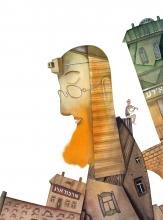
Is "sabbath" a verb?
Can one "sabbath?"
"I'm sabbathing right now"...or..."Mike is not available right now. He's out sabbathing somewhere and cannot be reached for comment."
I don't know.
I'm pondering this grammatical reframing of the word. Why? Well, it's a Commandment. Keeping the sabbath is a commandment (Exodus 20:8) right there with not murdering, lusting after your neighbor's wife, or worshiping other gods.
Yep, it's a commandment and I'm just plain terrible at keeping it these days.

Editor's Note: This is the fourth installment of Presbyterian pastor Mark Sandlin's blog series "Church No More," chronicling his three-month sabbatical from church-going. Follow the links below to read his previous installments, beginning in June.
- Church No More: Part 1 — Walking Away From Church
- Church No More: Part 2 — Church That Doesn't Steal Your Joy
- Church No More: Part 3 — The 'C' Word
- Church No More: Part 4 — I Don't Want to Go Back
A little over two months ago, I decided I'd spend my three-month sabbatical not going to church. Which might seem like a perfectly normal thing to do – except that I'm a minister. I've had some strange and wonderful experiences which I've written about, but possibly more strange and more wonderful than the experiences are the responses I've received.
From the very beginning the most frustrating response I get is not folks telling me I'll lose my faith if I leave church (and they have), or the ones telling me I can't begin to understand what it's like to be Spiritual But Not Religious (SBNR) in three short months (lots of those were also disturbingly aggressively worded), but rather the ones that say, “Oh, 'sabbatical!' Thanks. Now I have a word to call what I do! I stopped going to church years ago.”
“No!” I'd think while unsuccessfully trying to figure out how to reach through my laptop screen and shake some sense into them, “You are not on sabbatical! The sabbatical I'm taking about has to do with taking a rest, not leaving. It's rest and recuperation — communion with God in a way that is restorative. It's not about leaving! Sheesh.”
More than two months into my sabbatical, I now have to say, “Boy was I wrong.” They are on sabbatical, more so than I am.

All our life should be a pilgrimage to the seventh day; the thought and appreciation of what this day may bring to us should be ever present in our minds. For the Sabbath is the counterpoint of living; the melody sustained throughout all agitations and vicissitudes which menace our conscience; our awareness of God’s presence in the world.
—Abraham Joshua Heschel
The Sabbath
IF THE SEVENTH day is the Sabbath of my week, August is the Sabbath of my year. For most of my life, August has meant vacation. As a child, my parents would pack my brother and me into the station wagon, head to the ferry dock on the Connecticut side of Long Island Sound, and float across the water to the Hamptons, where my mother’s best friend, Patti, lived.
August meant long days in the sun at the beach and long dinners around Patti’s table with fresh zucchini, snap peas, tomatoes, and corn from the farm stand down the road. Some days—some of the most magical of my childhood—before dinner, Patti would hand me a little metal bucket and lead me across her gravel road to a bramble-laden field where we’d pick blueberries.
Nearly 40 years on, the muscle-memories I have of plucking those indigo gems from their prickly rests have not faded a bit. While I usually collect my blueberries these days from Trader Joe’s, I still pick through the berries as Patti taught me to, looking for the few errant green stems left behind by the processing plant.

Last week, I spent a couple of days listening to Eugene Peterson share stories and precious wisdom from his 80 years on this little blue planet.
It was a blessing of unparalleled riches to sit at Peterson’s feet (literally — I was in the front row and he was on a stage that put me at eye level with his black tassel loafers) and learn.
For the uninitiated, Peterson is a retired Presbyterian pastor and prolific author perhaps best known for The Message, his para-translation of the Bible and titles such as Practice Resurrection and A Long Obedience in the Same Direction.
A native of Western Montana, Peterson and his wife of more than 50 years, Jan, returned to Big Sky Country several years ago to the home his father built on the shores of Flathead Lake when Eugene was a child.
Undoubtedly, it will take me many months — or years — to digest all that Peterson shared with a smallish group of youngish Christian leaders at the Q Practices gathering in New York City. But I can say what struck me most indelibly is how at ease — content, yes, but more than that — Peterson is in his own skin. Fully present. Mellow but absolutely alert, energized, fascinated by the world and the people around him.
Relaxed — that’s it.
!["Moses mit den Gesetzestafeln" via Wylio [http://www.wylio.com/credits/Flickr/3542205854] "Moses mit den Gesetzestafeln" via Wylio [http://www.wylio.com/credits/Flickr/35](https://sojo.net/files/styles/medium/public/blog/duyde.jpg)
The primary political conversation that is happening in our country isn’t a dualistic battle between a “free market” system and a “statist/socialist” one. It is determining which mix of institutions and organizations are best equipped to meet societal challenges and achieve collective goals while allowing for individual freedom and human flourishing.
There aren’t many people who would argue that we need a new federal bureaucracy to run all of our grocery stores. But, you will find people who have varying views as to the government’s role in ensuring that those in need have basic access to nutrition, or what information the government should mandate that growers, producers, or sellers of food disclose to consumers.
Rabbi Spero makes some important scriptural points as to the importance of personal responsibility, human creativity, and freedom, but fails to deal with any passages that might temper or balance his views of capitalism.

Is The Bible A Reliable Moral Guide?; Why I Got Arrested At Occupy Wall Street; Unemployment Rates Drop In Most States;Black Friday And The Importance Of Sabbath Rest; Poor People To Get Poorer; Coptic Christians Living In Egypt Speak Out (VIDEO); Wall Street Will Never Be The Same Again; Occupy Wall Street And The Crisis Of Choice (OPINION); Candidates Face Foreign Policy Challenge; Don't Surrender To Laws Of Market, Pope SaysOut To Lunch: Congress Puts The Food Lobby Above Child Nutrition; Supercommittee Failure Puts U.S. At Risk (OPINION); Would The World Be Better Off Without Religion? (AUDIO); 'Thanksgiving To Almighty God' Presidential Thanksgiving Proclamations From George Washington To Barack Obama.
Editor's Note: HuffPost Religion is running a series of posts by Sojourners' Director of Mobilizing Lisa Sharon Harper and D.C. Innes, her co-author on the new book, Left, Right and Christ: Evangelical Faith in Politics, about how Christians should view social issues. Their first issue is Occupy Wall Street.
